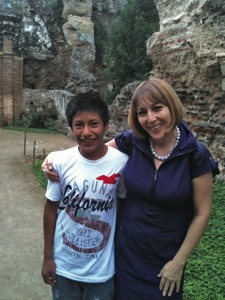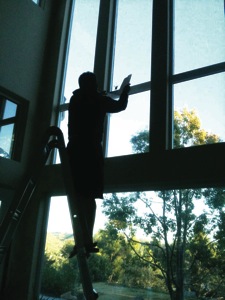
We all have different methods and beliefs, but I would say that most of us try our best to be good people. It is a shame that we do not have an easy way to measure our success, but I believe that’s what keeps us trying.
When my mom ran into the room screaming, my heart practically stopped. I had driven up to Poway to visit my parents and to find a nice, quiet place to write my column. Instead, I found myself pulled from my computer and rushed into the living room where a tiny hummingbird was desperately beating its wings and crashing against a huge window 15 feet up.
My mother whimpered nervously and begged for my father and me to save the bird. After many attempts to catch the hummingbird with the net from my parents’ pool, the little bird dropped itself down onto the window’s ledge and lay still. My mother screamed, “It’s dead,” and ran out of the room in tears.
Seeing my mother so upset made me feel awful, but it also reminded me of why I loved her. She grew up in one of the poorest countries in the world, surrounded by suffering, and that left her with an ever-bleeding heart and generous nature. Between providing medical interpreter services for disadvantaged minorities and occasionally paying a bridge toll for some random car behind us on the road, she taught me the meaning of kindness and empathy.
She’s no Mother Theresa, but she is genuine and comes across as selfless in her actions. She’s what I’d consider to be a good person. And while the apple hasn’t fallen far from the tree, I still don’t know whether or not I consider myself the same.
The other day, I stopped at a deli during my morning break at work and witnessed a fellow employee walk in and try to order himself breakfast. His card was declined and, embarrassed, he asked the cashier to run it once more. Sure enough, it was declined again. He handed back his already-boxed croissant, put his hood on, and walked out with his head down.
As I picked up my turkey-avocado, I did as my mother would have done and instinctively asked the cashier to add his food to my order. For only $1.50 more, my sandwich suddenly came with a generous helping of kindness.
I nervously delivered the breakfast to my coworker. The last thing I wanted was for him to feel like a charity case. I tapped him on the shoulder and handed him the box, “You wanted this right?” Realizing what I had done, he smiled gratefully and quickly responded, “Good lookin’ out, I’ll hit you back tomorrow.” I played it off appropriately and told him not to worry.
It was not until I walked away that I started to feel selfish and guilty. I realized that in addition to risking my coworker’s pride, I acted on my assumptions and motivations, and with zero knowledge of his true feelings. Everything had worked out in the end, but my satisfaction was stained by the guilt of a selfish mentality.

For whom had I really bought the breakfast? I couldn’t help but wonder if my mother also grappled with these complexities of kindness.
Life would be so much easier if we only dealt with the simplistic morality presented in video games. The game I’m currently playing often asks me to make a choice between paragon (good) and renegade (evil) responses and actions. Like in real life, I do my best to be good. Unlike real life, the right answers are highlighted for me in blue.
Unfortunately, in reality there is no easy right and wrong. There is no morality meter and there are no set good and bad endings. I can generously pay bridge tolls for cars behind me and I can buy hungry people sandwiches all I want, but there’s no guarantee that death will spare me tomorrow.
My life is just as fragile as a hummingbird.
As I walked into the garage to fetch my father’s ladder, I wondered if the hummingbird had been “good” in his or her short life. “Is there a bird Heaven?” I wondered to myself. I wanted there to be one.
As I propped the ladder against the window and began my climb, I became determined to feel good about buying my coworker a croissant. Actions were what counted, I decided. If we condemned every good action by the motivation or selfish thought behind it, no one would ever do good things.
I thought about all the volunteers I knew, the politicians I had worked with, and all the work I had done. There are egoists and power-mongers, and sure some people only come to activist events to find a date, but everyone works together to make powerful change. Together we accomplish wonderful things and set aside personal differences to celebrate our victories. “Actions are what count,” I repeated to myself.
My mom looked at me with watery eyes as I reached out to scoop up the hummingbird with a smaller net. No matter the outcome, I had made my good mother proud by trying to save the little bird. Whether I did it for her, the bird, or for me, it did not matter.
Good actions are good actions, and they make us good people. No matter where or why you start, you never know how far the ripples of change will go.
And as I brushed its little wing, the hummingbird flew up and into my net. I smiled excitedly as my mother cried out with joy. She rushed to open the door as I carefully climbed down the ladder. And together, we did something good.













Matthew, your writing gives me goosebumps. I couldn’t be prouder to have you as a friend.
Only wanna input on few general things, The website style is
perfect, the content is very excellent :D.